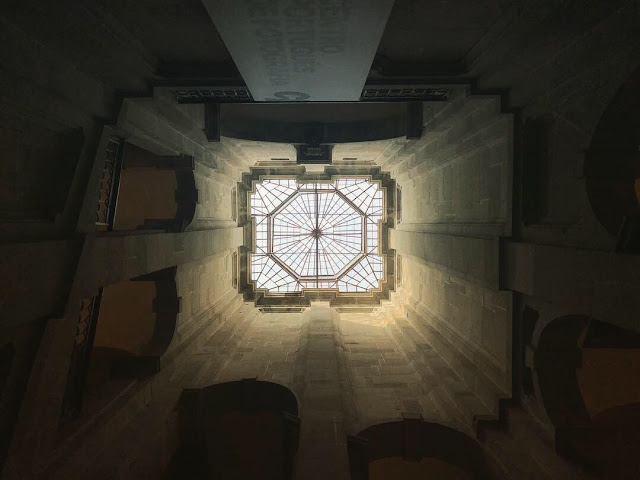But this is simply life. Though the timelines and specifics are special to
each of us, we all go through these transitions. We lose the people who helped us stay grounded. We lose the spaces and sidewalks that kept us company during the
loneliest early-morning hours. We lose the sense of innocence and wonder that
guided us before experience began clogging our emotions. Sure, we gain and we
grow from this grief, but we lose so much.
So when my dozing friend told me I was “brave,” I reassured
her that, like most people, I’m terrified every day: of knocking over fruit stands at the
supermarket, of forgetting to express something valuable to a person I care
about, of seeing my folded-up-and-tucked-away feelings pulled on or disregarded
or even merely acknowledged. I fear innumerable hypotheticals, from the trivial
to the profound. These imagined situations rarely come to pass, yet I suspect
they keep most of us disproportionately preoccupied. We’re all frightened in our
own awful and brilliant ways.
So what does bravery really mean? I’m scared by a lot of the
choices I make—I don’t think that’s unique—but I still move forward with them,
likely because I’m more unnerved by the alternative, by the path suggested by
a different choice. Many people navigate their entire lives this way, constantly
dancing ahead upon the hot coals of anxiety. But bravery has nothing to do with
an absence of fear. It is, of course, the will to keep moving despite those
reservations, the steaming blisters forming on our feet.
Which, naturally, makes all of us brave for simply breathing.
Full stop. The act of mere living, many days, requires a courage and resolve
that we don’t celebrate often or wildly enough. So let me remind you, person
reading this, that you are brave for getting out of your bed this morning. You
are brave for choosing to live through another day. You’re brave for putting
labor into anything you care about, and you’re brave for caring. You’re brave for
living in a world where you know you might—and probably will—lose some of the
people you love. You’re brave for continuing to love those people, maybe even
harder, in the face of that knowledge and the inevitable pain it will
eventually bring.
And so maybe this is what folks mean when they say brave. It’s
not code for “fearless” or “stoic,” but on the contrary: it’s a celebration of
sensitivity, of the private and starry-eyed hunger we all feel for this life, of the desire to seek change and development in the face of loneliness
or grief. It’s the determination to search for beauty in the chaos of our
wonderful, disastrous planet. It's being adventurous, and honest, and
vulnerable, especially when you don’t know where those actions may lead.
And so, reader, in the spirit of our collective fear, I challenge
you: pursue one unnerving impulse today. Act on something. Take a risk. Tell the truth. Whether
you’re reminding your high school English teacher what an impact she made on
your life or whether you’re selling all of your earthly possessions and joining
Scientology (please don’t actually do that), go out on that limb. Even if it’s
a little one. And if you’re feeling proud, drop me a line about it. Help keep
me accountable to my own directives, too.
As always, thank you for reading.
- "Running Scared," or how I feel on a daily basis, from Roy Orbison's Black and White Night (1988)










